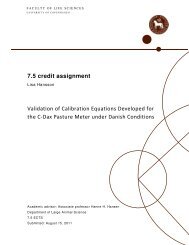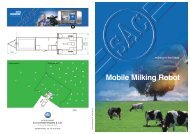Innovative Technology and Sustainable Development of Organic - 1.
Innovative Technology and Sustainable Development of Organic - 1.
Innovative Technology and Sustainable Development of Organic - 1.
You also want an ePaper? Increase the reach of your titles
YUMPU automatically turns print PDFs into web optimized ePapers that Google loves.
with AMS use, but these problems were rated higher by the advisors in both countries. Farmers<br />
connected the health <strong>and</strong> welfare aspects more directly to the robotic character <strong>of</strong> AMS, stating there<br />
was absolutely no negative influence <strong>of</strong> the machines. The advisors clearly saw the lack <strong>of</strong> grazing as<br />
an indirect consequence <strong>of</strong> AMS. This would eventually cause problems with health <strong>and</strong> welfare,<br />
according to the Dutch advisors. The discussions arising whilst prioritizing the issues showed that the<br />
stakeholders recognized that many issues were connected to grazing, as seen in the literature.<br />
Table 4. Focus group participants priority <strong>of</strong> nine selected sustainability issues’ importance when<br />
implementing AMS, scored (sc.) in consensus within the groups, by two different stakeholders,<br />
farmers <strong>and</strong> advisors in two countries, Denmark (DK) <strong>and</strong> the Netherl<strong>and</strong>s (NL).<br />
sc. NL farmers sc. DK farmers sc. NL advisors sc. DK advisors<br />
1 economy 1 economy 1 economy 1 economy<br />
2 grazing 2* grazing 2 grazing 2 concentrates<br />
3 technical 2 eutrophication 3 animal welfare 2 milk quality<br />
dependency<br />
4 sales 4 technical dependency 4 milk quality 4 technical dependency<br />
5 milk quality 5 sales 7 technical dependency 5 grazing<br />
6 eutrophication 6 milk quality 7 animal health 6 animal heath<br />
7 concentrates 7 animal health 7 eutrophication 7 animal welfare<br />
8 animal welfare 8 animal welfare 7 concentrates 8 sales<br />
9 animal health 9 concentrates 7 sales 9 eutrophication<br />
* Where the score shows the same number, this means that no priority was given within these<br />
issues<br />
To relate the discussion on grazing to the direct practice, the moderator asked for the farmers’ <strong>and</strong><br />
advisors’ perceptions on a possible new rule, prescribing grazing. The current EU st<strong>and</strong>ards state that<br />
in general cows should graze when possible. The Dutch authorities interpret this as a minimum <strong>of</strong> 120<br />
days <strong>and</strong> the Danish as a minimum <strong>of</strong> 150 days. The EU st<strong>and</strong>ards imply no grazing hours per day <strong>and</strong><br />
no strict control. A new rule could be that dairy cows should pasture for at least 6 hours a day on 150<br />
days per year <strong>and</strong> have access to an area <strong>of</strong> 0.2 ha per cow (in the grazing season). These time <strong>and</strong> area<br />
definitions have been suggested as sustainable measures by Danish authorities, addressing both the<br />
issue <strong>of</strong> eutrophication <strong>and</strong> the cows’ welfare.<br />
All groups mentioned <strong>and</strong> concluded that there are potential problems controlling such a rule<br />
(Table 5). All groups also acknowledged that if such a rule were enforced, some organic farmers<br />
would have to stop production. All other reactions on a possible new rule revealed different<br />
perceptions, resulting in a large variation within <strong>and</strong> among groups. Consequently, no general<br />
conclusions could be drawn. It is, however, worth mentioning that Danish advisors were mostly<br />
against extra restrictions. The Danish farmers concluded differently from their advisors, declaring that<br />
farms that could not live up to these rules should be excluded from delivering organic products.<br />
Thesis Frank W. Oudshoorn 29




